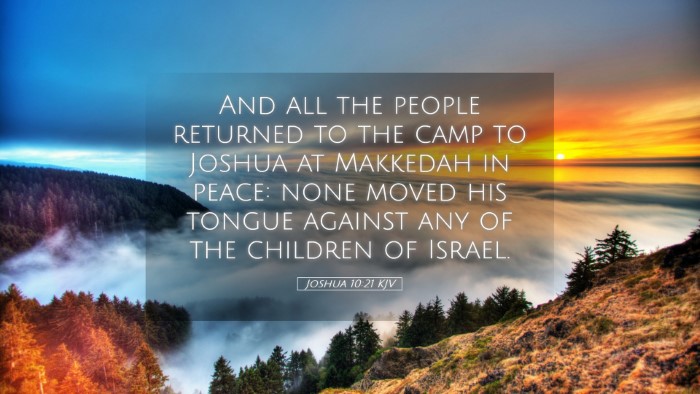Commentary on Joshua 10:21
Joshua 10:21 reads: "And all the people returned to the camp to Joshua at Makkedah in peace: none moved his tongue against any of the children of Israel."
Introduction
This verse encapsulates a significant moment in the history of Israel as they are establishing their presence in the Promised Land. The military campaigns led by Joshua demonstrate God’s faithfulness to His people and the fulfillment of His promises. This commentary aims to provide theological reflections and insights drawn from notable public domain commentaries.
The Context of Victory
In the preceding chapters, the Israelites face fierce opposition in their conquest of Canaan. Joshua, as the leader, exemplifies unwavering faith and obedience to God’s commands. The victory at Gibeon, concluded with divine intervention such as the hailstones and the stopping of the sun, sets the stage for this verse. Noted theologians like Adam Clarke emphasize that this intervention not only reveals God's dominion over nature but also His favor towards Israel.
The Return to Makkedah
The phrase "all the people returned to the camp to Joshua at Makkedah in peace" can be understood in multiple layers:
- Unity of Purpose: Matthew Henry remarks on the unity displayed among the Israelite ranks. After the conquest, the gathering of the people signifies a collective acknowledgment of God’s guidance and Joshua’s leadership.
- Peace after Conflict: Albert Barnes points out that the peace mentioned is remarkable considering the previous battles. It highlights the tranquility that follows divine victory and assurance.
The Significance of Silence
The latter part of the verse, “none moved his tongue against any of the children of Israel,” holds deep significance. In a world rife with discord and accusation, the absence of hostility among the nations is a testament to God’s intervention. Notable insights include:
- Fear of Israel: The silence is indicative of the fear that Israel instilled in the surrounding nations. Adam Clarke mentions that their triumph caused dread that stifled dissent and opposition.
- Divine Protection: The lack of verbal aggression reflects the divine protection God afforded to His people. This sentiment of safety echoes through Psalm 91, where God’s faithfulness shields His followers.
Theological Implications
Understanding this verse also provides profound theological insights:
- Covenantal Faithfulness: This event is a reminder of God’s covenant with Israel. His promises ensure security and victory as long as they adhere to His statutes. Henry emphasizes the importance of remaining steadfast to obtain God’s blessings.
- The Role of Leadership: Joshua’s leadership serves as a model for spiritual guidance. He directs his people effectively during a tumultuous period. Citing Clarke, we see that strong leaders instill faith and courage amidst adversity.
Practical Applications for Today
This verse speaks directly to the challenges faced by believers today. The principles of unity, peace, and divine assurance can be applied in various aspects:
- Community Life: Like the Israelites' return to Makkedah, congregations should seek unity and peace after facing trials. The need for collective worship and support is paramount.
- Trust in divine intervention: Emulating the faith displayed by Joshua can inspire believers to trust in God's providence during challenges, knowing He has power over all circumstances.
- Maintaining Silence Against Accusation: In a world filled with gossip and slander, the silence of Israel serves as a reminder to not contribute to discord, but rather to foster environments of respect and love.
Conclusion
Joshua 10:21 is not merely a historical recount but a poignant reminder of God's faithfulness and the unity that can arise from obedience to Him. As scholars reflect on this verse, its implications for leadership, community, and personal faith resonate deep within the core of Christian experience. As we study this verse, let us be inspired to reaffirm our trust in God’s promises, uphold the sanctity of unity, and pursue peace with one another, echoing the behavior of the children of Israel.


